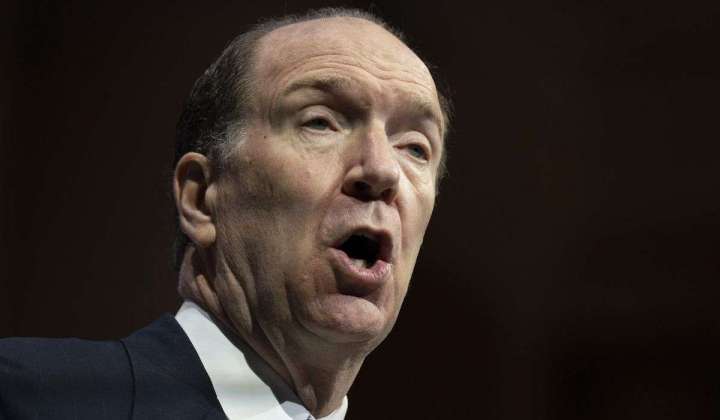World Bank’s David Malpass has stood up to radical green agenda

OPINION:
Among the elite, there’s a presumption that poverty and adversity lead to war. It may be an outmoded thought. There’s not much empirical data to back it up.
Nevertheless, since the end of the Second World War, the so-called developed nations that were called the First World before the term fell out of favor have shown a profound interest in helping the economies of the Third World, another phrase that has been dropped from the lexicon, improve their economies.
Among the institutions established to help do that is the World Bank, a multilateral financial institution that each year provides billions of dollars in loans and grants to developing countries trying to build up their economies and infrastructure.
Most Americans don’t understand or care to understand the intricacies of the issues involved. One who does is former Trump Treasury official David Malpass — and it is to the American taxpayers’ benefit that for the last several years he has been its president.
Mr. Malpass is leaving his post before the end of his five-year contract, one suspects, because a person can only keep legitimate global development projects separate from the climate change initiatives the Biden administration and most of the European states are pushing for so long.
Yes, it’s sad but true that most of the professional and political staff at the World Bank, as it is with most of the international development organizations into which the United States annually pumps billions of dollars, think forcing the world to go green at a ridiculous, counterproductive rate for its own sake is a virtuous act. He doesn’t.
It was Mr. Malpass, after all, who has said no to project proposals that would have spent millions or more building electrical vehicle charger stations in countries that do not have a reliable daily flow of electricity, fully developed power grids, or, for that matter, roads.
Former Vice President Al Gore, John Kerry and Greta Thunberg might think that would be a dandy idea, much like the business leaders in Manhattan cheered on the development of the infrastructure necessary to service Mexican copper mines that had no copper in Ayn Rand’s “Atlas Shrugged.” Fortunately for the rest of us, Mr. Malpass dared to recognize the fool’s errand he was being asked if not to undertake than at least to underwrite.
Indeed, the global warming elite led by Messrs. Gore and Kerry singled Mr. Malpass out as an impediment to their efforts. We should be grateful that he was, while still finding time to promote debt transparency and sustainability — despite a global pandemic that led to a downturn in business activity around the world — able to increase the money flowing into the institution while sustaining its AAA credit rating.
It’s a shame that Mr. Malpass, who says he will leave office at the end of June, won’t spend the rest of his tenure spending all the money in ways that imperil that bank’s ability to borrow more. His successor, prodded by the U.S. government and the leadership of the European states that are the bank’s biggest shareholders, will want to use its resources to fund the development of a global green energy infrastructure that is not needed or, as far as the technology goes, ready for commercialization.
There’s much work to be done. As Friedrich Hayek and others who studied the issue of economic development have theorized, economic gains are a necessary prerequisite to establishing a meaningful political system. People must be able to acquire property before they are concerned about protecting it, something the classic liberal tradition concedes is a necessary function of government.
There are too many parts of the world where this is still not the case. Elites hold power because they control access to capital, which must be democratized. Under David Malpass’ leadership, the World Bank was continuing its effort to move things in that direction. It is doubtful the person who follows him in that office will continue those efforts, which means tough times ahead for the developing world.






